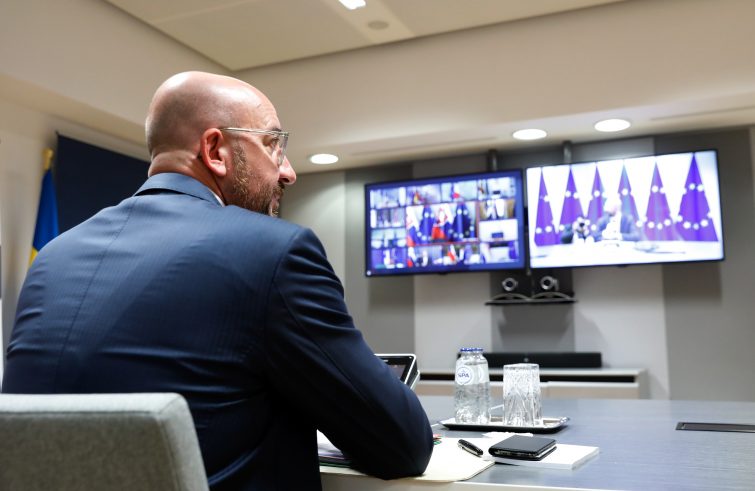
“This pandemic is putting our societies under serious strain. The well-being of each EU member state depends on the well-being of the whole of the EU” Charles Michel, President of the European Council, outlined the main points of the meeting of EU Heads of Government and State that took place yesterday by videoconference. The event centred on the means and tools to tackle the consequences of the Covid-19 emergency, notably on the economy, given that Europe is already experiencing a serious economic and job crisis, having far-reaching social implications.
“We welcomed the Joint Roadmap for Recovery. It sets out some important principles, such as solidarity, cohesion and convergence”, Michel pointed out. “It further defines four key areas for action: a fully functioning Single Market, an unprecedented investment effort, acting globally, and a functioning system of governance.”
Amidst a bombastic – even exaggerated – vocabulary, a long neglected term stands out: solidarity.
That same solidarity that had been somewhat sidelined – to say the least – during the sovereign debt and migration crises, is now being reaffirmed. National governments are perhaps finally realising what is at stake and that the EU, if properly harnessed in its spheres of competence (and in full respect of the principle of subsidiarity), can offer the necessary governance to tackle overwhelming challenges that exceed national governments’ scope for action. And the coronavirus is one of such challenges.
EU-27 leaders endorsed the three “safety nets ” for workers, businesses and sovereigns, included in the € 540 billion Eurogroup package. That is, the EMS (240 billion) with cross-compliance reduced to the minimum in terms of direct and indirect health expenses; EIB loans to banks and businesses (200), SURE to support social buffers (100). This package will have to be operational as of June 1, 2020.
Michel outlined the key passage of the European Council video conference: “We also agreed to work towards establishing a recovery fund, which is needed and urgent. This fund shall be of a sufficient magnitude, targeted towards the sectors and geographical parts of Europe most affected, and be dedicated to dealing with this unprecedented crisis.” The reference is to the so-called Recovery Plan, that could be described as a sort of modern Marshall Plan based on the “recovery bonds” which Italian Prime Minister Giuseppe Conte was so keen on, with a total liquidity of at least €1000 billion guaranteed by the EU multiannual budget. These are obviously loans that sooner or later, and at least in part, will have to be repaid. The Commission was asked to formalize the proposal by May 6 for evaluation by national leaders, in order to move on to the implementation phase: approval by the EU Council of Ministers and the European Parliament, bond issuance on the market, etc. The odds and ends deserve utmost emphasis, since the road from words to deeds can be fraught with hurdles, and be infinitely long, thereby missing the established deadline. As known, the devil is in the detail.
Political considerations require further reflection.
First of all, it can be said that the deadlock was broken because the situation of South European countries, notably Italy and France, proved to be so serious as to devastate anyone: companies, entire manufacturing sectors, millions of workers and families, nations and their respective public finances. Angela Merkel’s endorsement of the Recovery Plan speaks volumes in this regard. In fact it was an eye-opener even for the most economically and financially virtuous countries, including the Netherlands and Scandinavia. Despite themselves.
Moreover, nationalist leaders, including a number of well-known Central and Eastern European leaders, have tried to pull the break, but they too had to realize that there is no room for playing with fire, and that the same Community funds pouring in abundance from Brussels could disappear if the European Union were to lower its twelve-star flag.
A further hanging issue concerns the future of European integration. The frightening and deadly Covid-19 is seemingly reviving European reconciliation. The EU has already done a lot, and quickly, to respond to the pandemic: by strengthening the single market ( movement of health care workers and equipment, circulation of food, repatriation of EU citizens from abroad); by redirecting part of the funds to purchase equipment and medicines, improve treatment, carry out research on vaccines; by suspending the Stability and Growth Pact obligations thus allowing for deviations in areas such as the deficit for expenses related to Covid-19 emergency; and to give free rein to Member States on State aid thereby derogating from commonly agreed rules. In the meantime, the ECB announced €750 billion in bond purchases in 2020 in addition to €240 billion already planned in order to ensure financial stability to EU countries. But if the EU resumes its course it will need additional powers. Ceding some more – albeit partial – sovereignty will be necessary for it to function. Yesterday Angela Merkel made it clear, referring to the critical “coherence” of European fiscal systems. This would be an important step towards the achievement of economic and monetary union, heart and soul of an integrated economic – and political – system featuring a single currency. It’s a central aspect that cannot be ignored and must be addressed at European level.









